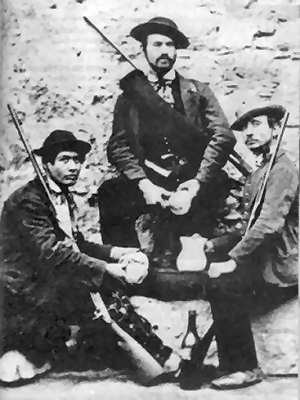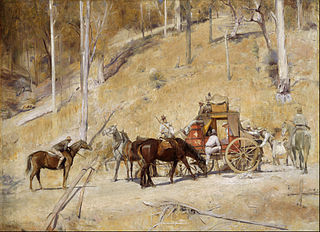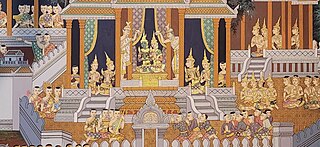
Dacoity is a term used for "banditry" in the Indian subcontinent. The spelling is the anglicised version of the Hindi word डाकू (ḍākū); "dacoit" is a colloquial Indian English word with this meaning. It appears in the Glossary of Colloquial Anglo-Indian Words and Phrases (1903). Banditry is a criminal activity involving robbery by groups of armed bandits. The East India Company established the Thuggee and Dacoity Department in 1830, and the Thuggee and Dacoity Suppression Acts, 1836–1848 were enacted in British India under East India Company rule. Areas with ravines or forests, such as Chambal and Chilapata Forests, were once known for dacoits.

Organized crime is a category of transnational, national, or local group of centralized enterprises run to engage in illegal activity, most commonly for profit. While organized crime is generally thought of as a form of illegal business, some criminal organizations, such as terrorist groups, rebel forces, and separatists, are politically motivated. Many criminal organizations rely on fear or terror to achieve their goals or aims as well as to maintain control within the organization and may adopt tactics commonly used by authoritarian regimes to maintain power. Some forms of organized crime simply exist to cater towards demand of illegal goods in a state or to facilitate trade of goods and services that may have been banned by a state. Sometimes, criminal organizations force people to do business with them, such as when a gang extorts protection money from shopkeepers. Street gangs may often be deemed organized crime groups or, under stricter definitions of organized crime, may become disciplined enough to be considered organized. A criminal organization can also be referred to as an outfit, a gang, crime family, mafia, mob, (crime) ring, or syndicate; the network, subculture, and community of criminals involved in organized crime may be referred to as the underworld or gangland. Sociologists sometimes specifically distinguish a "mafia" as a type of organized crime group that specializes in the supply of extra-legal protection and quasi-law enforcement. Academic studies of the original "Mafia", the Italian Mafia, as well as its American counterpart, generated an economic study of organized crime groups and exerted great influence on studies of the Russian mafia, the Chinese triads, the Hong Kong triads, and the Japanese yakuza.

A tradition is a system of beliefs or behaviors passed down within a group of people or society with symbolic meaning or special significance with origins in the past. A component of cultural expressions and folklore, common examples include holidays or impractical but socially meaningful clothes, but the idea has also been applied to social norms and behaviors such as greetings etc. Traditions can persist and evolve for thousands of years— the word tradition itself derives from the Latin word tradere literally meaning to transmit, to hand over, to give for safekeeping. While it is reportedly assumed that traditions have an ancient history, many traditions have been invented on purpose, whether it be political or cultural, over short periods of time. Various academic disciplines also use the word in a variety of ways.
Salvatore Giuliano was an Italian brigand, who rose to prominence in the disorder that followed the Allied invasion of Sicily in 1943. In September of that year, Giuliano became an outlaw after shooting and killing a police officer who tried to arrest him for black market food smuggling, at a time when 70 percent of Sicily's food supply was provided by the black market. He maintained a band of subordinates for most of his career. He was a flamboyant, high-profile criminal, attacking the police at least as often as they sought him. In addition, he was a local power-broker in Sicilian politics between 1945 and 1948, including his role as a nominal colonel for the Movement for the Independence of Sicily. He and his band were held legally responsible for the Portella della Ginestra massacre, though there is some doubt about their role in the numerous deaths which occurred.

A highwayman was a robber who stole from travellers. This type of thief usually travelled and robbed by horse as compared to a footpad who travelled and robbed on foot; mounted highwaymen were widely considered to be socially superior to footpads. Such criminals operated until the mid- or late 19th century. Highwaywomen, such as Katherine Ferrers, were said to also exist, often dressing as men, especially in fiction.
Labor history is a sub-discipline of social history which specializes on the history of the working classes and the labor movement. Labor historians may concern themselves with issues of gender, race, ethnicity, and other factors besides class but chiefly focus on urban or industrial societies which distinguishes it from rural history.

Banditry is a type of organized crime committed by outlaws typically involving the threat or use of violence. A person who engages in banditry is known as a bandit and primarily commits crimes such as extortion, robbery, and murder, either as an individual or in groups. Banditry is a vague concept of criminality and in modern usage can be synonymous for gangsterism, brigandage, marauding, terrorism, piracy and thievery.

A fence, also known as a receiver, mover, or moving man, is an individual who knowingly buys stolen goods in order to later resell them for profit. The fence acts as a middleman between thieves and the eventual buyers of stolen goods who may not be aware that the goods are stolen.
The noble outlaw is a literary archetype found in cultures around the world. Other phrases denoting the same or a similar concept include "knight-errant", particular to European medieval chivalric romance literature, and Byronic hero, especially in European Romanticism.
Dulla Bhatti popularly known through his Punjabi moniker Rai Abdullah Khan Bhatti' or Dullah, was a Punjabi folk hero who led a revolt against Mughal rule during the reign of emperor Akbar. He is entirely absent from the recorded history of the time, and the only evidence of his existence comes from Punjabi folk songs.

Social banditry or social crime is a form of social resistance involving behavior that by law is illegal but is supported by wider "oppressed" society as moral and acceptable. The term "social bandit" was invented by the Marxist historian Eric Hobsbawm and introduced in his books Primitive Rebels (1959) and Bandits (1969). Hobsbawm characterized social banditry as a primitive form of class struggle and resistance in pre-industrial and frontier societies. Social banditry is a widespread phenomenon that has occurred in many societies throughout recorded history, and forms of social banditry still exist, as evidenced by piracy and organized crime syndicates. Later, social scientists have also discussed the term's applicability to more modern forms of crime, like street gangs and the economy associated with the trade in illegal drugs, or the Mafia.

The structure of social class in Cambodia has altered several times throughout its history. The traditional hereditary elites were marginalised in the 1970s, when military leaders gained prominence, before the Khmer Rouge attempted to dramatically eliminate existing class structures in the late 1970s. Since the emergence of peace in the early 1990s, social inequality has increased in Cambodia.
Romanticised outlaws are stock characters found in a number of fictional settings.

Invented traditions are cultural practices that are presented or perceived as traditional, arising from people starting in the distant past, but which are relatively recent and often consciously invented by historical actors. The concept was highlighted in the 1983 book The Invention of Tradition, edited by Eric Hobsbawm and Terence Ranger. Hobsbawm's introduction argues that many "traditions" which "appear or claim to be old are often quite recent in origin and sometimes invented." This "invention" is distinguished from "starting" or "initiating" a tradition that does not then claim to be old. The phenomenon is particularly clear in the modern development of the nation and of nationalism, creating a national identity promoting national unity, and legitimising certain institutions or cultural practices.

Eric John Ernest Hobsbawm was a British historian of the rise of industrial capitalism, socialism and nationalism. His best-known works include his tetralogy about what he called the "long 19th century" and the "short 20th century", and an edited volume that introduced the influential idea of "invented traditions". A life-long Marxist, his socio-political convictions influenced the character of his work.

Edward Palmer Thompson was an English historian, writer, socialist and peace campaigner. He is best known for his historical work on the radical movements in the late 19th and early 20th centuries, in particular The Making of the English Working Class (1963).
The Communist Party Historians' Group (CPHG) was a subdivision of the Communist Party of Great Britain (CPGB) that formed a highly influential cluster of British Marxist historians. The Historians' Group developed social history, which was popularised in the 1960s with "history from below" approach described by E. P. Thompson. During the heyday of the Historians' Group, from 1946 until 1956, notable members included Thompson, Christopher Hill, Eric Hobsbawm, Raphael Samuel, as well as non-academics like A. L. Morton and Brian Pearce. The Historians' Group arose at the University of Cambridge in the 1930s under the encouragement of the economist Maurice Dobb.
Bulla Felix was a legendary Italian bandit leader active around 205–207 AD, during the reign of the Roman emperor Septimius Severus. He gathered a band of over 600 men, among them runaway slaves and imperial freedmen, and eluded capture for more than two years despite pursuit by a force of Roman soldiers under the command of the emperor himself.

The Chambal is a geographical and cultural region in north-central India. It lies along the Chambal and Yamuna river valleys, in southeastern Rajasthan, southwestern Uttar Pradesh and northern Madhya Pradesh.
Primitive Rebels is a 1959 book by Eric Hobsbawm on pre-modern European social movements and social banditry.












